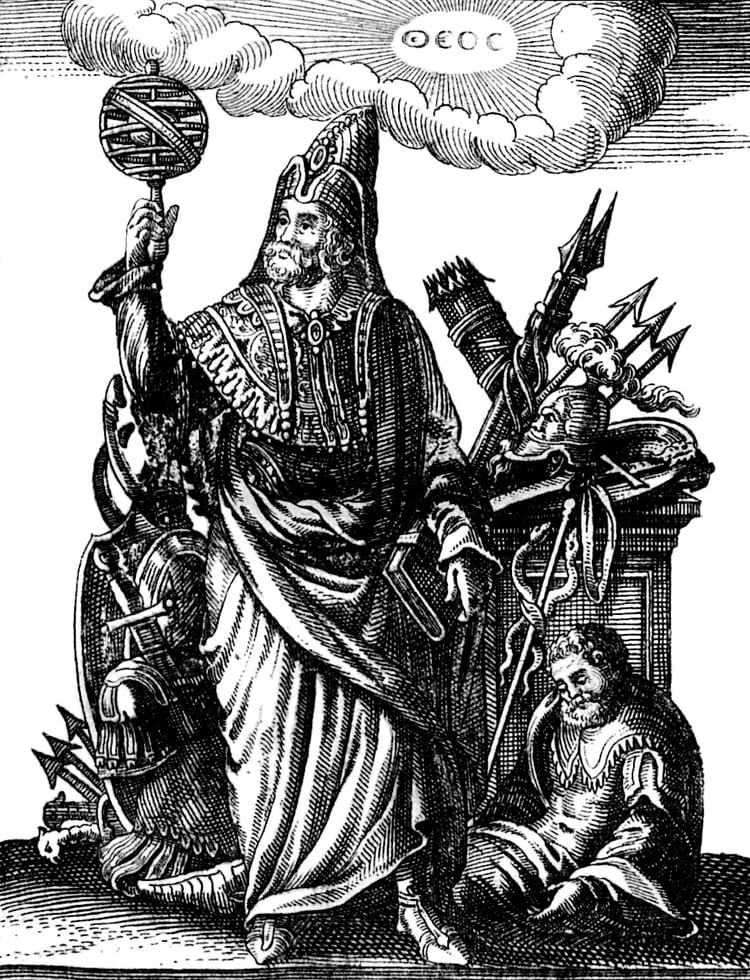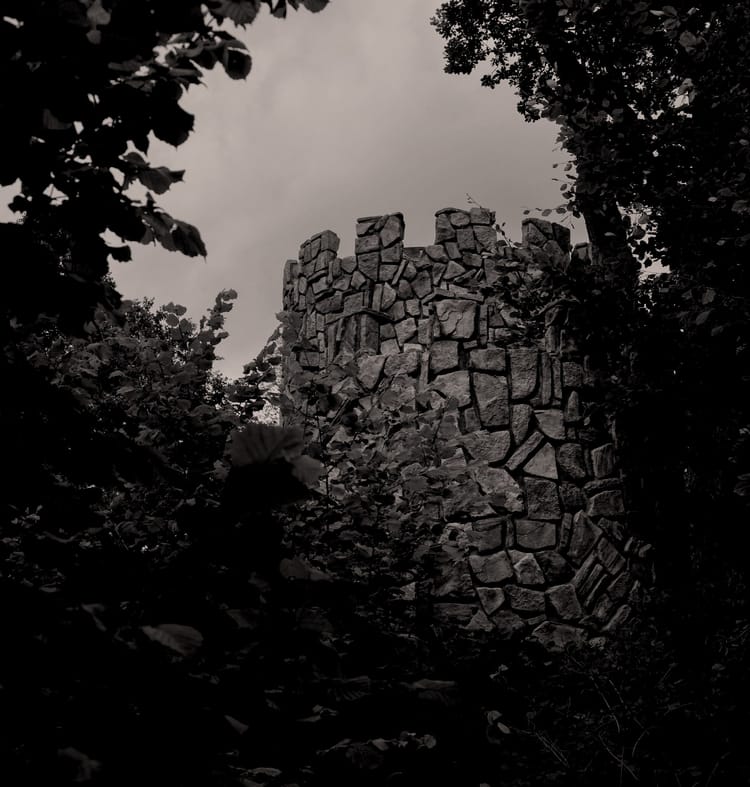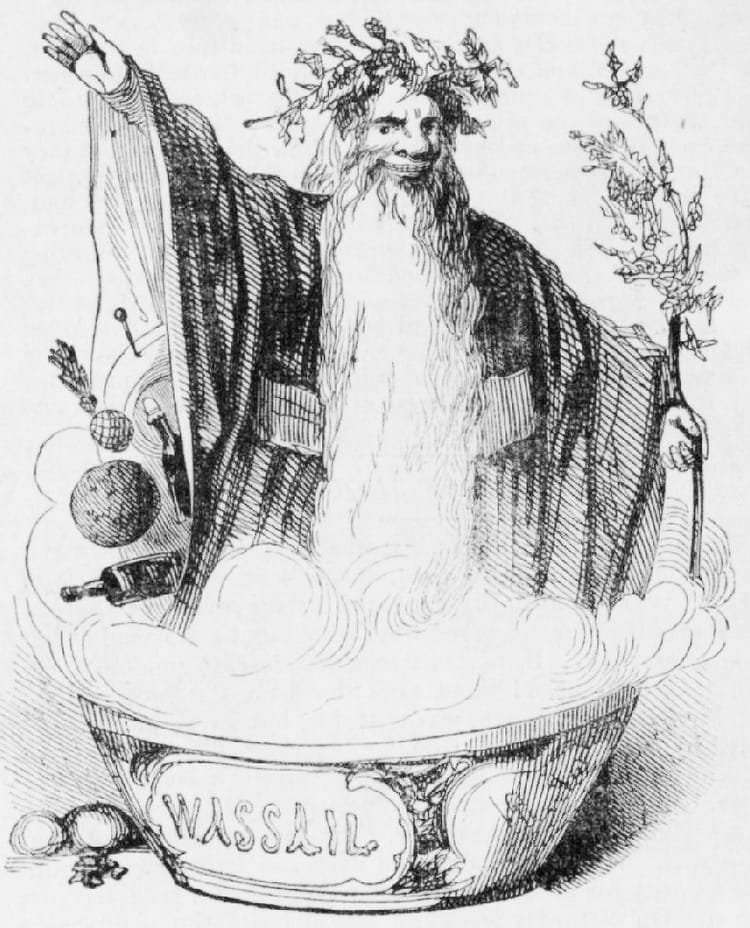New Moon: On rites of passage

Hello. It's Friday, and I have some thoughts again about ordeal.
Back for the New Moon in January, I tried to offer some definition around what ordeal means to me. Two months later, I extended ordeal thoughts to encompass the question of whether purification rites matter in a sinless cosmology; but ironically this was a bit of a diversion from the four core motivations for ordeal that I listed in the first post, which are as follows:
- Trauma healing through bilateral stimulation, building resilience, and productively reliving/controlling prior harmful experiences
- Ritualizing BDSM on the axis of s/m (pain) and not just the axis of D/s (power)
- Achieving mystic states of consciousness for occult understanding
- Forming consensual rites of passage for community building on an intimate and animist level, of which contemporary capitalist-colonialist society is damagingly bereft
Today I'm going to finally tackle this list, though as I apparently can't go in "obvious" order with it at all, I will actually be starting at the bottom and working loosely upward. Because the bottom is the foundation, and everything above it is its own rite of passage too.
Severed relations
As I and many other people have written about before — in my case here — in Europe, the birthplace of capitalism, the heart of white hegemony, the greatest breeding ground of ecocidal ideologies, in that place it began with the dispossession and colonization of most people already living there. Land was enclosed and privatized. But as I haven't dwelled on so much yet, this same violent disruption came for distinct animist customs.
At first it was an imperial swallowing: through Rome, then through medieval Christianity, as the customs persisted but their practitioners were pressed to manifest them only in ways that the state or Church tolerated. During the Reformation, previously communal rites then began to fragment and atomize further, until religion paradoxically became a guiding principle for whole nations but not with any tools that real people could actually use. The ever-splintering kaleidoscope of Protestant faiths diluted the value of religious community for increasingly greater numbers of people, and for those people to whom it did become any succor, it took this paradoxically austere, still rather un-animist form in contrast to the worldly excesses of its twin, capitalism, whose morals were intertwined completely with Protestant ideology.
In that bloody birthing, of course, even more exceptional violence happened as modern colonialist settlement beyond Europe got underway. Indigenous peoples worldwide were robbed of their land, either through theft or through being snatched off of it as chattel slaves; so too did the great hegemony strip away their customs, even criminalizing them. There were periods of the British colonization of India where yoga (in all senses of the word), traditional dance styles, or similar practices were banned. Within the history of the so-called United States, abusive boarding schools for indigenous children persisted well into the middle of the 20th century partly because of how it remained functionally illegal to speak indigenous languages or perform many tribal rituals. Missionaries facilitated the replacement of native religion with Christianity; in this Protestants were not the only sect to blame, as proselytism is a key flaw of nearly all Christianities, and again Catholic (or Orthodox) comfort with colonial homogenization is rooted as far back as the late Roman Empire.
I will come back to the criminalization of specific indigenous customs further down. First, I've laid these statements out in order to establish that regardless of whether one's ancestors had their traditional land relations severed before the modern colonial era or during it[1], most people living in hegemonic, capitalist, white-supremacist, predominantly-anglophone societies today have also had their traditional ways of relating to each other severed.
Lost rites of passage nakedly demonstrate how those social relations have changed. Once upon a time, in the precursors to these societies, there were highly localized, non-commercial, communally facilitated rites to initiate people into specific phases of life or into specific subcommunities. It wasn't only the ritualization of legal contracts (e.g. weddings) or of physically necessary procedures (e.g. funerals, disposing of human remains), but also the ritualization of puberty, of old age, of gender affiliation, of learning particular skills, of adopting particular animal kinship tokens, and much more. What I want to emphasize, however, is not simply how many rites there were, but what they were, and the breathtaking diversity of how each rite (or pattern of rites) might vary from tribe to tribe, clan to clan, region to region. In each case there might be a very precise and prescribed way of doing things, but communities grouped together by common language (for example) didn't have universalized ritual dogma on that level.
Today, the contrast is easy to sense in your gut. Within the context of the reigning hegemony, the rites of passage are either homogeneous industries (proms, graduations), "ethnic curiosities" (bar/bat mitzvahs, quinceañeras), or simply absent. They are also typically rather sanitized in their most mainstream forms; there are few sacrifices or endurance tests, unless you count filling in black circles on pieces of paper for several hours and having your circle choices rated on a cold mathematical scale. In US culture most of all, sexual recognition or symbolism is quite unpalatable; the prom, originating from debutante balls, is a place for sexually maturing young adults to commune and explore with each other, but actually educating them about sex beforehand (never mind encouraging them to have it) is anathema in many municipalities. And whatever the case, all remaining rites are fundamentally disjointed: they are whitewashed silhouettes of things that were often forcibly taken away from specific cultures.
The consequences have been various and widespread, but the one that weighs most heavily on my own heart is the crisis — or rather crises — of identity affecting so many people over the last few generations as the process of homogenization has gone more global than ever before. Almost everyone living a non-indigenous, non-animist lifestyle is affected, whether they can be neatly lumped together as marginalized vs. privileged or whether their situation is much more complex. Lost rites of passage matter induce lost senses of identity because identity is not an absolute marker, not a simple demographic tickbox, but rather who we are in relation to other people. So many of us have been left to figure out our identities for ourselves, lacking ways to productively connect with the people most like us, lacking ways to build bridges with people less like us. Neoliberal politics demand that we waste so much time fruitlessly defining and redefining ourselves according to rubrics of suffering (that which we experience on ourselves or that which we have the social "right" to inflict on other people), but it gives us no framework for crafting interpersonal relationships that counteract the suffering.
Our souls need homes where completely new identity languages are spoken. But lots of people, especially online, can only chase their own tails and default to social legislation about how the current, broken language ought to be used, whether they're grasping at something more "progressive" or they're backlashing terf-style, incel-style, fash-style.
Fumblings on the fringe
Having said all of this, I'm now going to look away from the mainstream as such. For although so many unique, culturally linked rites of passage have been lost, this doesn't stop people from constantly trying to form and practice new rites. Here is a very, very small sampling of what I mean:
- Hazing rituals for fraternities and related "male bonding" activities (as well as for women's equivalents and less specifically gendered clubs)
- Summer camp ceremonies
- Body modification as a lifestyle focus
- Budding practices in trans communities for marking transition
- Rocky Horror virgins losing that virginity
- BDSM and leather culture protocols
- Of course virtually all "Western" occult/esoteric organizations of any size reaching back for hundreds of years, and likewise for more recent pagan/animist revival movements
All of these examples lie on some kind of fringe. Naturally, some occupy a much more distant fringe than others; but they are notable because they're not something that everyone in capitalist, white-settler, Christian-majority, anglophone-majority society/societies experiences or even considers "normal," and beyond that they are linked with a deliberate cultural carving-out of a mini-society within the wider one.
Interestingly, quite a few (though not all) examples on this list inherently involve tokens of ordeal, too — whether that of pain or fear or humiliation. Not all the ordeals or pseudo-ordeals are fully consensual, sometimes wildly the opposite, but usually the person undergoing the ordeal is aware in advance that something unpleasant is going to happen. Ideally they have a real chance to back out or stop. But for better or worse, I notice the repeating theme of ordeal through this list as the sign of a two-headed truth: in our endemically violent society, it's instinctive (perhaps especially for men) to create violent rites; while in the animist societies that this one has wrecked and pillaged, violence also remains but in a carefully managed fashion, and this would emerge in rites of passage as much as in any other part of that life.
Lastly, I would also consider all these listed examples to show a certain fumbling quality. That's not a negative judgment on its own, or I wouldn't take part in some of these activities myself. I only mean that the rites of passage embedded therein either a) were not consciously planned as that, or b) show that someone saw the baseline value of such rites and then took everything in absolutely the wrong direction. From the latter case we see the online induction of fascists yet again, and from both cases we run into the spectre of cultural appropriation. For the latter, I'm most familiar with mistakes made by summer camps (sorting campers into "Indian tribes" with stereotyped war paint and feathers), body modders (see the Modern Primitive movement for theory and a lot of bad "tribal tattoos" for practice), and the nexus of BDSM and spirituality found in ordeal work. Among all these, and even with the rest of the list that I've glossed over, some appropriations seem exceptionally galling because of how the practices in question were once colonially criminalized.
Why does cultural appropriation happen in these situations? I think it's because of a difficult underlying problem: unique, non-commercial, and ideally land-connected rites of passage are badly needed among people who don't have them, and the easiest reference points therefore can be found among recent and surviving indigenous practices. It's all too tempting to try joining in on those practices — but both for the sake of protecting those practices from exploitation and due to the nature of how indigenous knowledge is typically transmitted in the first place, those practices are typically closed, i.e. requiring official membership in the cultural group that actually practices it, and if they're more open then that they are still initiatory.[2] This hasn't stopped colonizers from "playing Indian" and equivalents for millennia[3], but they — we, properly including myself — need to stop regardless if there's to be even a prayer of actual decolonization.
Thus, when it comes to developing rites of passage I have been thinking about this via the same decolonial education I've been trying to integrate into all my lifeways for some number of years. I don't have concrete "suggestions" because I'm not sure who's listening who needs to hear them, and everything I'm about to say next comes with the mighty disclaimer that all my thoughts are continuously in progress, in process. I could realize tomorrow that I've written bullshit. But as my thoughts flow today, here is where they've gone: in crafting new rites of passage, even a lot of the most self-conscious white-assigned settlers are currently in a mindset of "try something 'exotic' first, ask forgiveness later," and they/we would do better to develop more intentional practices from these other options instead:
a) Seek actual membership within an initiatory non-European practice. This is more viable for some practices than others, and obviously if they're open vs. closed that matters a great deal. Also, I'm well aware that for someone to walk such a path, they must prepare to do an extraordinary amount of hard work, probably for years, and de-center their ego completely. Despite some areas of interest that I have here, I am quite simply not ready, so that's one reason why my own rites[4] deliberately do not incorporate some things that I'm ill-prepared to handle.
b) Create rites based on closer ancestral ties. This should not eliminate the option of natural cultural exchange, otherwise you've/we've accidentally reinvented white nationalist paganism.
c) Create rites out of the syncretic affinities of the participating community... with humility and caution. Those last four words are the difference between business as usual versus a transformative version. Be self-aware and honest about what's coming from a closed vs. open practice, an initiatory vs. non-initiatory one. Research before adopting. Be willing to jettison some practices if you/we find that you/we haven't really been given permission.
I could end this post here, but as usual, I'm not inclined to tie things up that neatly. Because for strategy c), I also frequently find that fellow settlers start to want some magical authority figure to swoop down and hand down laws about what can or cannot be borrowed. That is never going to happen, because nobody can speak for the entirety of even just one colonized people, let alone all of them. And even if that were the case, we still have to give up the idea that we can always act correctly, even though that's a hard thing to relinquish in a white, culturally Christian mentality. On the one hand I feel like I should surely try to "do better," but on the other hand this can't be done for the sake of shoring up my own insecurities. It must be done for the other people I want to form better relations with.
I would like to encourage other people in my colonial position to both listen to what indigenous and/or "non-Western" figures are willing to culturally extend to us, and to also not be surprised to hear totally opposite sentiments from other people of that same background. I think we need to internalize a willingness to absorb a multitude of voices and continuously learn, engage, shift approaches — to accept, truly accept, that we are quite frequently clueless fools. Fools with our own human rights, of course, but fools nonetheless.
Arbitrating without authority
It's most crucial to undo the settler urge for constant moral high ground when there's a matter of cultural exchange that isn't transparently appropriative, but might be. You can get by easily enough if you're being initiated into a closed practice, because then whoever the authority is over what's yours to use, they are in all likelihood the authority over what's yours to now pass on to oursiders; you're now part of the closed system and you have someone to easily defer to. But outside those circumstances, as stated above you can't merely seek permission from one member of the cultural group that you're about to borrow from. Why should they even talk to you about it? Why have you selected them in particular? Do they really have the authority to speak for everyone else in their group?
And most uncomfortably of all: can you, and should you, even try to get permission to be inspired by rites that are culturally specific as a whole, but which contain elements that are less specific? Some might argue that no elements should be decontextualized from their roots, but conversely some customs belong to so many people worldwide in a general way — if we're still focused in any way on rites of passage, then I might point to circumcision, tattooing, and ritual hairstyling, insofar as they all have certain very culturally specific forms but at least in my opinion you could ethically perform a rite of passage ordeal that incorporates foreskin removal, tattooing, or shaving some part of your head, without necessitating any one cultural context for it.
In the kink scene, at least as it manifests online, there is currently an evolving and overdue debate about cultural appropriation of spiritual/ordeal hook pulls and hook suspensions. This didn't prompt me writing this post, which I had planned to write for months, but it felt serendipitous for me to see other people talking about this topic over the last week.
For some context, when it comes to historical use of flesh hooks to suspend one's body or tug multiple people's bodies back and forth, this is well attested among several indigenous tribes of this continent, mostly on the Great Plains — I'm most aware of the Sun Dance and its Mandan variant the Okipa ceremony (warning: in supplying these links there are images included that may go against any potential taboos about photographing or representing details of these rituals). Similar practices are meanwhile found in the traditional Tamil dance Kavadi Aattam. All of these rituals were explicit inspirations in the past several decades for white outsiders to adopt and craft endurance ordeals that also use flesh hooks, often both kinky and spiritual in nature; considering the sanctity of something like the Sun Dance, which was kept out of indigenous hands for generations until the Canadian and US governments decriminalized it in the mid-20th century, now some people in the kink scene have started speaking up about how this kind of direct cultural lifting is probably quite disrespectful. At the same time, I have seen some people counter-claiming that the ritual use of flesh hooks is not something that anybody specific can "own" — that perhaps nobody should claim to be performing the Sun Dance, Okipa, or Kavadi Aattam when they don't belong to the applicable culture, but that's a different matter from cultural outsiders never doing their own hook pulls/suspensions at all, spiritual or not.
To me, this is indeed very complicated. I would certainly grant that metal hooks are a virtually universal tool that lack cultural specificity on their own, and that just about any culture has at some point or another incorporated skin piercing into rites of passage, torture, or both. On that basis I'd suppose that if anyone, regardless of background, wanted to suspend themselves from hooks or do a hook pull with someone else for erotic torture purposes, it would be strange to say they shouldn't. Likewise, as there's perilously little information about what some pre-Christian cultures might have done for their own spiritual ordeals, in an attempt to regenerate animist practices of any kind it seems plausible in my own head for someone to use hooks (as much as another tool) as part of a rite of passage in the tradition they're trying to build.
But simultaneously, I have long had mixed feelings about some examples of functionally "white" hook suspensions/pulls that I've seen documented, hence why I thought this debate was overdue. It does seem to me like the language typically surrounding these hook activities is disconcertingly blithe about the indigenous inspiration, whether through failing to provide any acknowledgment (which by now in the 2020s could be genuine ignorance) or through fetishizing that origin. I'm not sure what arbitrating organization can or ought to give permission for people to incorporate hooks into their (spi)ritual kink, but at the same time I think at minimum it's valuable for a lot of kinksters to be having this conversation instead of awkwardly sweeping awkward phrasing and frameworks under the rug.
All of which is to say, I feel confused about whether specific hook activities ought to stay off-limits, yet I would agree that some surely ought. I more or less endorsed one example in my first post on ordeal, because it seemed from my perspective to be deliberately detached from Sun Dance-like practices — but this doesn't mean I would endorse all examples, and I suspect (besides typical safety and consent considerations) that hook pulls/suspensions are not activities to engage in unless you've truly thought about the whole context, you're prepared to avoid certain angles, and you can acknowledge that what you're doing is fundamentally not the same thing as the closed-practice version. In my own case, even as a masochist who's starting to get over fears of puncture play I can't say I feel ready to accept the weight of cultural responsibility around flesh hooks. Others' mileage may vary.
In saying so, maybe I'm giving too much leeway to other settlers on the matter, and maybe I've given too much. I hope fervently that if I'm wrong I'll figure it out soon enough; but I tell myself again not to be paralyzed by the fear of wrongness.
And although I've opened up a realm of ambiguities, I will even state one thing that I believe quite firmly: even if the basic foundations of certain rites are not closed practices, the specific cultural manifestations are. Nobody owns tattooing, but I feel rather confident in asserting it would be disrespectful to get Māori tattoos without either being Māori or being offered them by a Māori artist and showing the proper respect for the significance of those tattoos after the fact.
This can become exhausting to think about for too long. I, and people working from my colonial position, we settlers, do need to do this work rather than stay in fragile, silent corners — but of course capitalism also wants everyone to stay navel gazing rather than doing real solidarity, so I can understand wanting to relax from thoughts like these before they threaten to overwhelm with split hairs and straw men and the whole morass of online rhetoric. Nevertheless —
Why go to the trouble?
The very fear of that neoliberal identity exhaustion is exactly why I want full, colorful, explosive, heteregeneous rites of passage back in the world. It is just as I stated earlier in this post.
We are all children of trauma and the trauma is only deepening. To heal, we must reconnect with each other as much as we must reconnect with the land. And to help those who have been hurt the most recently — whose wounds have had less time to heal, and in many cases are not healed at all — it's imperative not to inflict more damage, or that will eventually make connection impossible.
So we need new rites of passage. That does not mean we need them at any cost; and in a way, if the wrong cost is paid then we will not find those rites.
[1] And as usual, because it doesn't always go without saying, although the intra-European trauma on this front is very real and important to both acknowledge and study, those of us inheriting such a legacy always have a responsibility to account for how the more recent trauma inflicted on other peoples by our confused, misled ancestors is still at a stage where making active reparations is both possible and necessary. What kings and priests and landlords and bosses inflicted on us long ago, before we were lumped together as "white," is not a reason to downplay immediate, ongoing, life-destroying abuses of other communities.
[2] I've read conflicting opinions about whether closed vs. open practices are as I've described them here or if any initiatory practice is closed and then it's simply a question of whether cultural outsiders are permitted initiation. I really don't know what's the best interpretation, so I've gone with what feels the most linguistically clear to me, but I welcome feedback.
[3] For more on this phenomenon affecting Native American and First Nations tribes in particular, Dakota scholar Philip J. Deloria's 1998 classic Playing Indian is utterly crucial reading.
[4] Admittedly, my own rites do not involve those "of passage" very much yet. What I'm writing about in this post largely concerns rites that necessarily involve a small community's participation. The rites that belong to my owner and I alone are well-established between us, whereas the rites that ought to exist in our ideal community are still a matter of speculation.
Thank you for reading. Next week I'm going to write about my experience making my first corn dolly for the start of harvest season, but this will be for paid readers only, so please consider upgrading your subscription if you'd like to read that post and get this newsletter closer to justifying its operating cost. The week afterward, though, I'll be back to free posts for a little while, starting with a long-promised post on astrology.





Member discussion